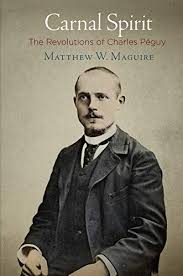Jay Tolson at The Hedgehog Review:
 To be sure, enlightened progressives were committed to science, positivism, and liberal democratic values—all of which the reactionaries rejected in favor of hierarchy and a highly traditionalist, and exclusively Catholic nationalism. It would seem to be a clear-cut struggle between the modernists and the antimodernists, but not as as Péguy saw it. He found the progressive faith in a scientifically driven and ever-improving future no more immanentizing, and no more modernist in its deepest aspirations, than the reactionaries’ vision. “These wrathful particularists,” Maguire explains, “often intimate a loyalty to older notions of transcendence—including religious faith and its avowal of abiding truths—but they conceive of that which transcends time only as an arrested immanence. They often present an amalgamated past as a unity…which now must be reinserted mechanically into the present, without creativity or surprise.” More ironically, some of the faux antimodernists (including the right-wing Action Française founder Charles Maurras, an admirer of the positivist Auguste Comte) also believed that “‘science’ would “confirm their particularism and prejudices.” Péguy’s critical stance toward both broad coalitions made him neither a modernist nor an antimodernist, Maguire argues, but something quite distinctive and instructive: an amodernist.
To be sure, enlightened progressives were committed to science, positivism, and liberal democratic values—all of which the reactionaries rejected in favor of hierarchy and a highly traditionalist, and exclusively Catholic nationalism. It would seem to be a clear-cut struggle between the modernists and the antimodernists, but not as as Péguy saw it. He found the progressive faith in a scientifically driven and ever-improving future no more immanentizing, and no more modernist in its deepest aspirations, than the reactionaries’ vision. “These wrathful particularists,” Maguire explains, “often intimate a loyalty to older notions of transcendence—including religious faith and its avowal of abiding truths—but they conceive of that which transcends time only as an arrested immanence. They often present an amalgamated past as a unity…which now must be reinserted mechanically into the present, without creativity or surprise.” More ironically, some of the faux antimodernists (including the right-wing Action Française founder Charles Maurras, an admirer of the positivist Auguste Comte) also believed that “‘science’ would “confirm their particularism and prejudices.” Péguy’s critical stance toward both broad coalitions made him neither a modernist nor an antimodernist, Maguire argues, but something quite distinctive and instructive: an amodernist.
more here.
